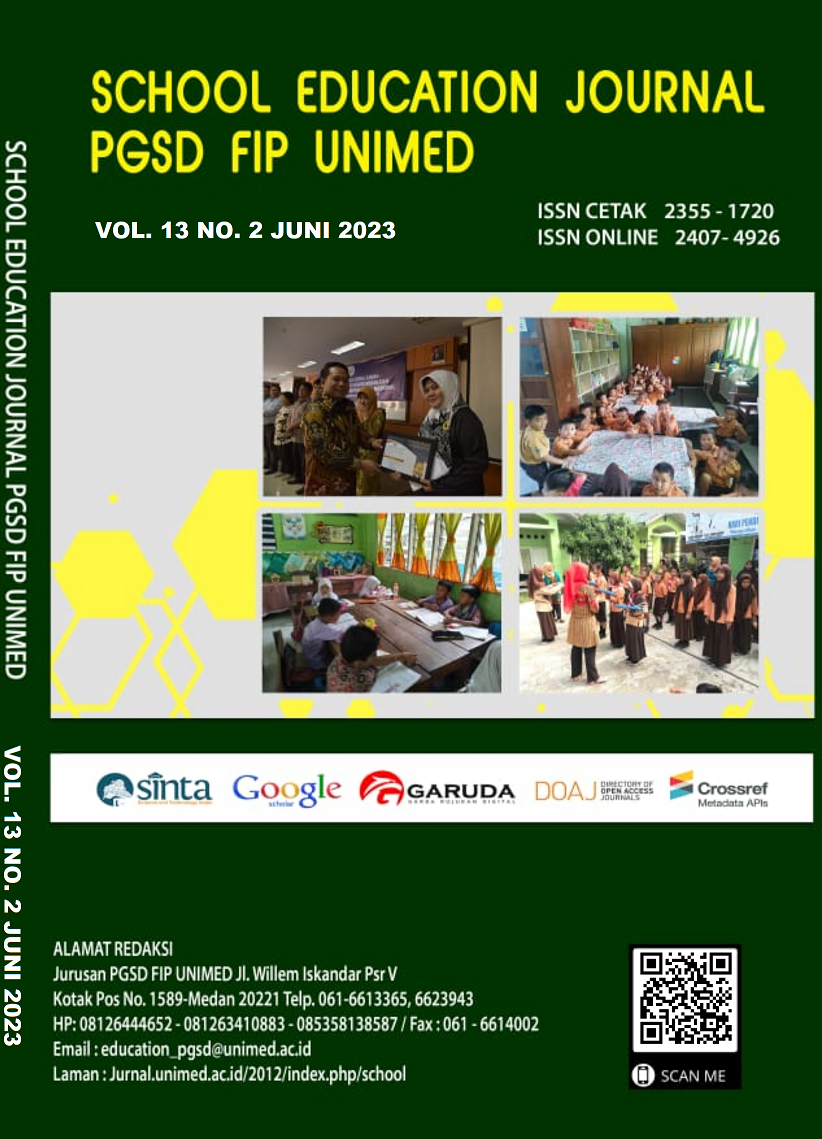PENERAPAN PROSES PEMBELAJARAN KREATIF DALAM MENINGKATKAN MOTIVASI BELAJAR SISWA
DOI:
https://doi.org/10.24114/sejpgsd.v13i2.45719Keywords:
Creative Learning, Teacher's Role, Student Motivation.Abstract
The purpose of this research is to study the application of creative learning and the role of the teacher so that students' motivation in class 1-A at SD Negeri 085115 Sibolga can increase. This research was conducted because there was a problem of low student motivation in learning. This study used qualitative research methods. Data analysis was carried out by going through the data reduction stage, and then the data obtained was presented in the form of a qualitative description. Data was collected through observation, interviews, field notes and documentation. The research results show that learning in class 1-A SDN 085115 Sibolga is focused on students with the aim of creating a comfortable, safe and enjoyable learning atmosphere. Teachers play an important role in designing innovative and interesting learning methods to increase student motivation. The use of IT-based media and collaboration models and games are also used to stimulate students' thinking and thinking. Various teaching models are used to increase student motivation and teachers encourage critical thinking through challenging questions, exploring ideas, and understanding topics. In addition, the teacher also gives praise and appreciation as an effective way to acknowledge students' efforts in learning.References
AM, S. 2016. Interaksi & Motivasi Belajar Mengajar. Jakarta: Raja Grafindo Persada.
Ependi, S. 2018. Penerapan Metode Tanya Jawab Untuk Meningkatkan Prestasi Belajar Bahasa Indonesia Siswa Kelas VI Sd Negeri 012 Pangkalan Baru Kecamatan Siak Hulu. Primary : Jurnal Pendidikan Guru Sekolah Dasar, 7(2), 2598“5949. https://primary.ejournal.unri.ac.id/index.php/JPFKIP/article/download/6269/5719
Manizar, E. 2015. Peran Guru Sebagai Motivator Dalam Belajar. Tadrib, 1(2), 204“222. http://jurnal.radenfatah.ac.id/index.php/Tadrib/article/view/1047
Moleong, L. J. 2017. Metodologi Penelitian Kualitatif. Jakarta: Remaja Rosdakarya.
Muslih. 2016. Pemanfaatan media pembelajaran berbasis ICT pada lembaga pendidikan non-formal TPQ. Dimas: Jurnal Pemikiran Agama Untuk Pemberdayaan, 16(2), 215“234. https://journal.walisongo.ac.id/index.php/dimas/article/view/1090
Pentury, H. J. 2017. Pengembangan Kreativitas Guru Dalam Pembelajaran Kreatif Pelajaran Bahasa Inggris. Faktor Jurnal Ilmiah Kependidikan, 4(3), 256“272. https://journal.lppmunindra.ac.id/index.php/Faktor/article/view/1923
Sari, W. N., Murtono, & Ismaya, E. A. 2021. Peran Guru Dalam Meningkatkan Motivasi Dan Minat Belajar Siswa Kelas V SDN Tambahmulyo 1. Jurnal Inovasi Penelitian, 1(11), 2255“2261. https://stp-mataram.e-journal.id/JIP/article/view/472
Sugiyono. 2013. Metode Penelitian Kuantitatif, Kualitatif, Dan R&D. Bandung: Alfabeta.
Sundari, F. 2017. Peran Guru Sebagai Pembelajar Dalam Memotivasi Peserta Didik Usia SD. Prosiding Diskusi Panel Pendidikan œMenjadi Guru Pembelajar, 67. https://journal.lppmunindra.ac.id/index.php/repository/article/view/1665/1287
Suprihatin, S. 2015. Upaya Guru Dalam Meningkatkan Motivasi Belajar Siswa. Jurnal Pendidikan Ekonomi UM Metro, 3(1), 73“82. https://ojs.fkip.ummetro.ac.id/index.php/ekonomi/article/view/144/115
Wahyuni, A., Hartana, D. D., & Rachmad, S. S. 2020. Metode Pembelajaran Yang Digunakan Oleh Guru Sekolah Dasar. PENSA : Jurnal Pendidikan Dan Ilmu Sosial, 2(2), 23“27. https://core.ac.uk/download/pdf/327208753.pdf
Downloads
Published
Issue
Section
License
Authors whose manuscripts are approved are approved as follows:
The publication rights for all journal manuscript materials published/published on the SEJ (School Education Journal) E-Journal site are held by the editorial board with the author's knowledge (moral rights remain with the manuscript authors).
The formal legal requirements for accessing this electronic digital journal article are subject to the terms of the Creative Commons Attribution-ShareAlike (CC BY) license, which means that E-Journal SEJ (School Education Journal) has the right to store, transfer media/format, manage in the form of a database, maintain, and publish articles without asking permission from the author as long as the author's name remains as the copyright owner.
Manuscripts published/published electronically are open access for educational, research, and library purposes.

